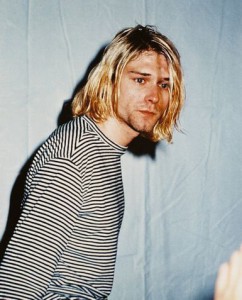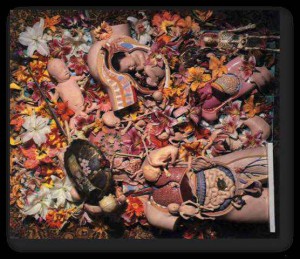“The song is about a person who’s beyond depressed; they’re in their death bed, pretty much.” This was what Kurt Cobain said in a 1993 interview with Impact, concerning the song Pennyroyal Tea; the Nirvana single that never was.
Intended as the third single to be released from Nirvana’s In Utero album after Heart-Shaped Box and All Apologies, the Pennyroyal Tea single was cancelled after Cobain’s death in April 1994.
At that time it was only retail versions of the CD single manufactured in Germany that are said to have been already distributed, though a promotional CD single was made in the UK, copies of which are thought to have survived.
Though the label claimed to have destroyed everything it could, a number of copies of the Pennyroyal Tea single were unaccounted for, having escaped the destruction via various avenues.
Surviving original copies of the single are, needless to say, collector’s items. This is beginning to sound a little bit like devoted monks scurrying to save precious scrolls of forbidden texts from Imperial burning, but you get the picture.
Sleeves were made for the 7″ single in England but the label insisted that the vinyl itself was never manufactured. That’s why although artwork for the 7″ and the cassette single has been seen in pictures for years, the actual products themselves were allegedly never made.
The main reason given for the single’s cancellation was that the record label didn’t want to be seen to be profiting from Cobain’s death; though the fact that the B-side was I Hate Myself and Want To Die may have had a lot to do with the decision too. Originally intended as a sarcastic comment on his portrayal in the media, according to Cobain himself; I Hate Myself and Want To Die could no longer be seen as anything so tongue-in-cheek after the grim end to the Cobain and Nirvana story in April 1994.
Recorded by Steve Albini for In Utero in 1993, the Scott Litt mix of the song appeared on censored versions of the album and is also the mix that featured on the single.
The song, however, had been around for a while before that, having been played at Nirvana shows as far back as 1991. Fans argue about which mix of the song is superior, but I’ve personally always been more than happy with the Steve Albini mix on the album – it really amplifies that song’s strengths perfectly, the refrained, melancholy tone of the verses and the driving power of the choruses both.
In the same ’93 interview with Impact, Kurt explained that “Pennyroyal tea” was a “herbal abortive” and that he had friends who had “tried to use that and it never worked”.

But he also explained the song was essentially about depression. Suggestions that the title is actually a play on words (as in ‘penny royalty’) have never been validated by anything Kurt ever said about the song.
It is a somewhat depressing song in part, but in true Cobain style it also has a strange sweetness and tunefulness to it with an accompanying hint of optimism, the same way All Apologies does; unlike, say, most Joy Division songs, which are just fully bleak and depressing, Kurt’s songs often managed to feel both sad and life-affirming at the same time somehow.
Though In Utero as an album is of course filled with reference and imagery concerning the life-cycle, pregnancy, birth and death, foetuses (foetus imagery permeates the album’s imagery and packaging, from the pregnant angel figure on the front to the original artwork back cover being photography of a collage of foetuses that Kurt had made himself), the lyrical imagery on Pennyroyal Tea is the most memorable on the album.
Arguments and interpretations about the powerful lyrics and imagery of the song may go on for decades; like a lot of Cobain’s songs, the lyrics and meanings seem to have multiple layers, which is why they’re endlessly fascinating. The lyrical references to anemia, ‘bad posture’, ‘laxatives’ and ‘antacids’, as well as pennyroyal tea itself, can be taken literally as medicinal and health concerns on one level (as references to his chronic stomach problems, his drug addiction, etc), and as more metaphorical on another.
Pennyroyal tea being a purgative (which causes abortion when taken in excess), the lyrics can be interpreted both as a reference to a physical purging and to a more spiritual purification at the same time.
Or at the extreme end the notion of self-abortion. The tone and feel of the track certainly feels like the last testament of a character at the end of himself, which is partly why it resonates so much. The sad impression I’ve always had was that Kurt was so sick of his body and its various ailments, discomforts and dependencies, but also so sick of the corresponding ailments of his mind and ‘soul’, that he just wanted to purge, purify, all of it, cleanse himself almost and just start again.
That’s always been my perception of much of In Utero in general and of Pennyroyal Tea in particular; but the extraordinary thing about it is how triumphant, almost celebratory, it sounds in the choruses despite the lyrics, and especially when it flows into that brilliant bridge/solo.

Far from being grim, it feels like a glorious purification, a glorious cleansing of impurities, a powerful surge/journey into a better state. It somehow manages to sound resigned and liberated at the same time.
Only Kurt could do that.
“I’m anemic royalty” is the line that most eludes interpretation; but some interpret it to refer to Cobain’s rock ‘royalty’ status and his self-perceived deficiencies (hence anemic) in that role. The second-verse line “..give me a Leonard Cohen afterworld” was explained by Kurt to have been a reference to Leonard Cohen’s subscribing to Buddhist spiritual beliefs, of which Kurt also was then taking an interest in.
When asked about Kurt’s reference to him in the song, Cohen once said; “I’m sorry I couldn’t have spoken to the young man. There are always alternatives and I might have been able to lay something on him. Or maybe not.”
At any rate, however we choose to interpret its meaning, Pennyroyal Tea is an extraordinary song, as remarkable now as it was twenty years ago.
Both lyrically and musically it remains both fascinating and beautiful. I’ve always been glad, however, that it’s All Apologies and not Pennyroyal Tea that closes the album; though both songs are bittersweet, the former at least is more of an overall more upbeat note to end Nirvana’s final album on.
Tomorrow, April 19th, as part of this year’s Record Store Day, the Pennyroyal Tea single is re-released on 7″ vinyl, limited to only 6000 copies; almost two decades exactly from its originally intended release as what would’ve been the final Nirvana single.





[…] peniorial” No úteroSegundo Cobain, sobre uma pessoa desesperada que está na morte. Ele Sua luta com dor crônica e problemas de estômago inspirou a música e mencionou que ele era […]
[…] peniorial” No úteroSegundo Cobain, sobre uma pessoa desesperada que está na morte. Ele Sua luta com dor crônica e problemas de estômago inspirou a música e mencionou que ele era […]
[…] “Pennyroyal Tea” is a metaphor for wanting to cleanse oneself. Pennyroyal tea is an herbal abortifacient, and Cobain uses it to symbolise a desire to rid himself of pain and unwanted parts of his life. The song’s references to anaemia, antacids, and “give me a Leonard Cohen afterworld” reflect both his physical suffering and his longing for escape (Burning Blogger). […]
First person I have seen to acknowledge penny royal tea and penny royalties and his expression towards his worth, it seems so obvious to me but who knows, either way it’s a beautiful play on words that kirk was known for, not sure why people are so obsessed with the antidepressant when he was on heroin, unlikely that was a significant part of his life worthy of a song
Autocorrect on his name ergh
Fair observation, Daniel. Thanks.
nice